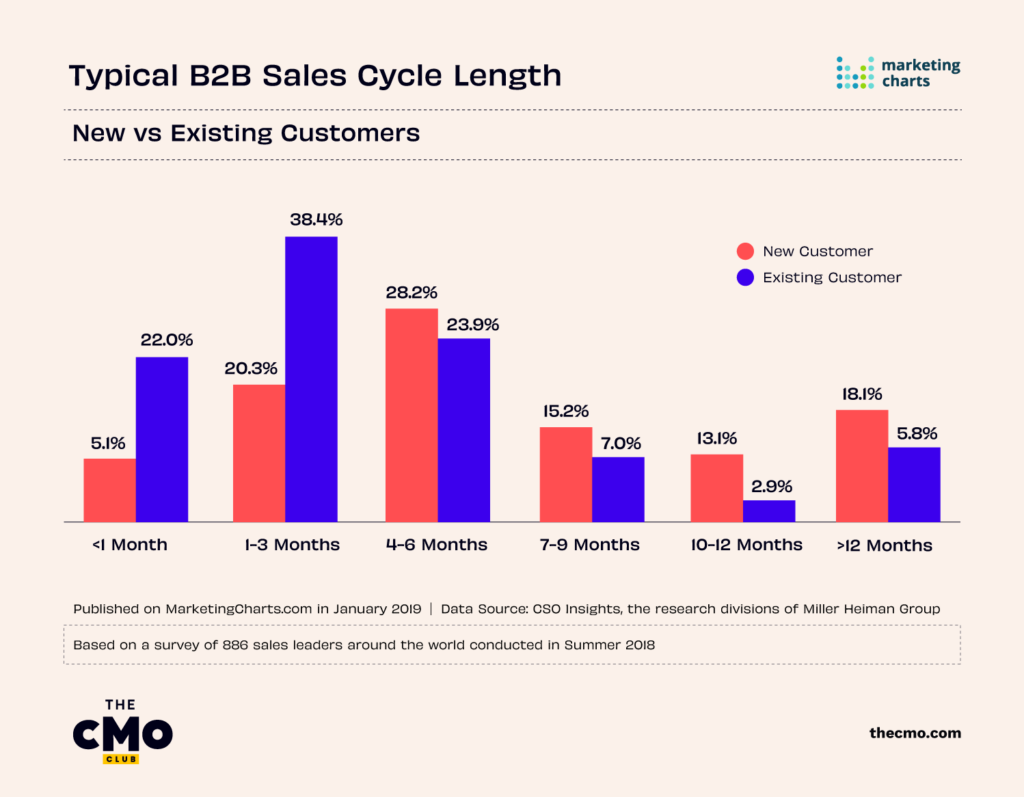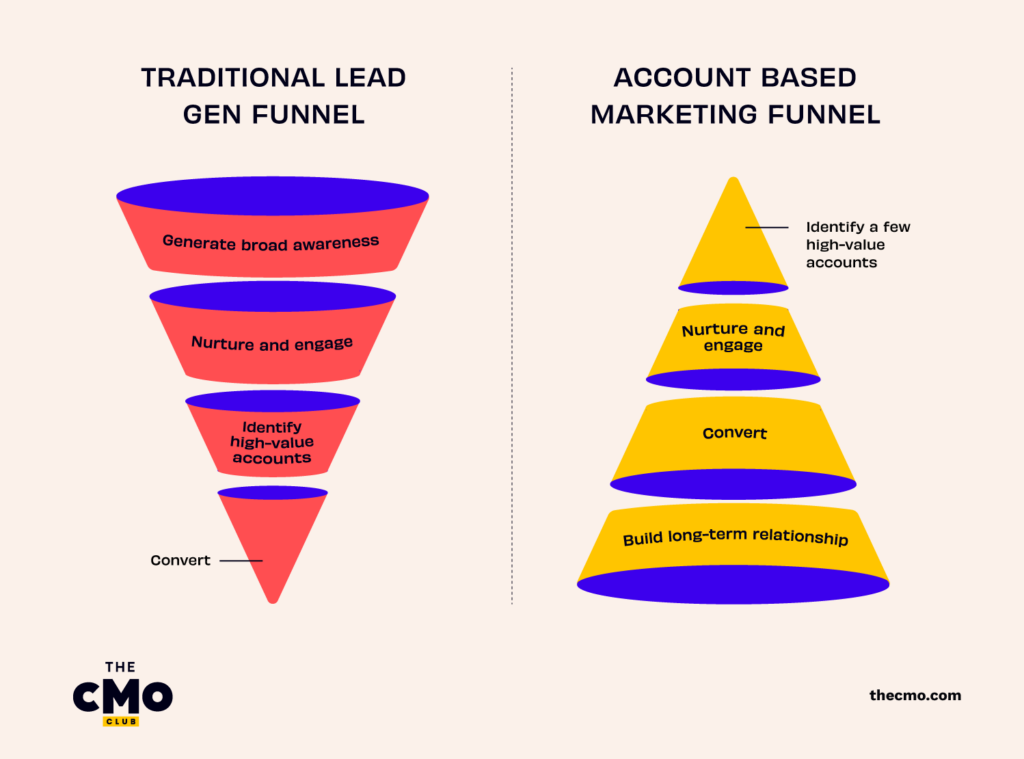Account-based marketing (ABM) and marketing automation serve different purposes: ABM targets high-value accounts with personalized strategies, while marketing automation streamlines repetitive tasks across broader campaigns. Understanding these differences is crucial for effective implementation.
ABM follows an inverted funnel approach, focusing on pre-qualified leads from the start: This contrasts with marketing automation's traditional funnel, which engages a wide audience and nurtures leads over time. This fundamental difference impacts how each strategy is executed and measured.
Your choice between ABM and marketing automation should be based on specific business needs: ABM is ideal for B2B companies with complex, high-value sales cycles. Marketing automation suits both B2B and B2C businesses looking to scale their marketing efforts efficiently. Consider your goals, budget, and implementation capabilities before deciding.
Wondering which side to pick in the account-based marketing vs. marketing automation debate? It doesn't help that both promote benefits such as increased ROI, improved efficiency, and enhanced collaboration.
Despite similar benefits, account-based marketing and marketing automation involve separate strategies and tactics for successful implementation. While there is some crossover, you’ll need to understand when, where and how to use each approach to achieve your goals.
In this article, we'll explore the key differences between both, their unique benefits, and help you pinpoint which of them is the best marketing software for your marketing strategy.
What is Account-Based Marketing?
Account-based marketing (ABM) is a marketing strategy that targets specific high-value accounts rather than casting a wide net to attract leads. In an ABM strategy, your focus is on creating hyper-personalized experiences and offers.
To do this, targeted accounts are analyzed as they move through the funnel, allowing messaging, offers and outreach to be tailored to the unique needs of high-value clients. This differs from traditional mass marketing, where the goal is to appeal to a broader audience.
Benefits of an Effective ABM Strategy
The primary benefit touted for account-based marketing is high ROI, making it popular with marketing and sales teams. For this reason, 71% of B2B companies increased their ABM spend in 2023, citing "substantial business returns" as their motivation (Momentum ITSMA, 2023).
The secret sauce that fuels these impressive ABM results? A focus on target accounts that are primed for conversion.
An account-based marketing strategy trades large lists of potential leads for focused target account lists and qualified leads, which are identified through lead scoring. This approach encourages increased collaboration between sales and marketing teams, and results in heightened efficiency and better use of resources.
In short, the benefits of account-based marketing include:
- Higher ROI through focused targeting of high-value accounts
- Enhanced collaboration between sales and marketing
- Increased efficiency in resource utilization
- Personalized marketing efforts leading to stronger relationships
- Improved conversion rates and larger deal sizes
What is Marketing Automation?
Marketing automation is a subsection of marketing technology, comprising software designed to automate repetitive marketing tasks. The goal of integrating marketing automation is to enhance the results of your marketing strategy by using technology to improve productivity, organization and data analysis.
By automating repetitive tasks, such as email marketing, social media scheduling, lead nurturing, campaign tracking and more, marketers are free to focus their time on more impactful areas. Marketing automation tools are particularly important for scaling marketing efforts and maximizing efficiency across multiple channels.
Benefits of an Effective Marketing Automation Strategy
Marketing automation software is a vital component of a modern marketing strategy. 94% of B2B marketers state that marketing automation helps them achieve their goals.
The detailed analytics provided by these platforms allow you to track performance, optimize campaigns, and make data-driven decisions, leading to better outcomes and higher ROI.
The benefits of marketing automation include:
- Increased efficiency through the automation of repetitive tasks
- Enhanced customer engagement and personalization
- Improved lead management and nurturing processes
- Better data and insights for optimizing marketing strategies
- Higher ROI through streamlined and effective marketing efforts
Account-Based Marketing vs. Marketing Automation: Differences & Similarities
Account-based marketing vs. marketing automation can be a confusing comparison, given that they complement each other well despite having different goals and tactics. However, a thorough understanding of each approach's impact on your marketing operations is essential for successful implementation.
Here is a summary of how account-based marketing and marketing automation are different and similar in a few core areas:
| Differences | Similarities | ||
| ABM | Marketing Automation | ||
| Goal | Focuses on targeting high-value accounts with personalized engagement. | Aims to automate marketing processes and improve efficiency across various channels. | Both seek to improve marketing efficiency and ROI. |
| Tactics | Personalized outreach, account-level targeting, and relationship building. | Automated email campaigns, social media scheduling, lead nurturing, and tracking. | Both use data-driven tactics to enhance marketing effectiveness. |
| Use Cases | Ideal for B2B markets with long sales cycles and multiple stakeholders. | Suitable for both B2B and B2C markets, particularly for scaling and managing broad campaigns. | Both can be used to streamline marketing efforts and achieve business goals. |
| Personalization | Highly personalized, focusing on deep engagement with specific high-value accounts. | Personalized at scale based on behavioral and demographic data. | Both enhance personalization to improve engagement and outcomes. |
| Data Usage | Uses detailed account-level data for targeting and personalization. | Utilizes a range of data (demographic, transactional, engagement) to optimize processes. | Both rely on data to improve marketing strategies and decision-making. |
| Automation | Some automation, used to improve the collection of intent data, lead scoring and creation of target account lists. | Extensive automation of repetitive tasks, such as email campaigns, social media posting, campaign reporting and more. | Both approaches aim to increase efficiency and productivity by automating tedious or complex tasks where possible. |
| ROI | Improves ROI through focused targeting and deep account engagement. | Improves ROI through efficient process automation and broad lead nurturing. | Both aim to deliver a higher ROI through their respective strategies. |
| Implementation Complexity | Complex. Requires close collaboration, detailed research and high-touch campaigns. | Generally simpler. Involves setting up automated workflows and systems. | Both approaches require thoughtful planning and integration to be effective. |
| Customer-centricity | Deeply customer-centric, focusing on individual account needs and relationships. | Customer-centric through personalized communication and engagement at scale. | Both strategies aim to enhance customer relationships and satisfaction. |
Account-Based Marketing vs. Marketing Automation: Differences
1. ABM is More Complex to Implement
Account-based marketing typically involves a more complex implementation process compared to marketing automation. It helps to think of ABM as a framework of marketing tactics that must be executed in a specific order to be successful.
This requires close alignment between sales and marketing teams, as they must be able to analyze your target market in order to identify, score and prioritize high-value accounts. A successful ABM strategy hinges on perfecting your ideal customer profile (ICP) and target account list prior to account engagement.
However, marketing automation is often used to reduce the complexity of an ABM approach as part of a multi-tool martech stack. For example, marketing automation can assist in collecting intent data, which provides insights into your target audience's actions, behaviors, and interests.
2. ABM Best Suits B2B, While Marketing Automation is Versatile
While ABM and marketing automation can benefit any business, ABM is best suited for B2B markets. This is due to the nature of the B2B sales-cycle, which typically involves a longer duration, multiple stakeholders, and larger deal sizes.
In contrast, marketing automation is versatile and can be applied to both B2B and B2C markets, streamlining a wide range of marketing processes. Account-based marketing is often overkill for a B2C business, as it requires a significant time investment that may not align with the shorter, more trend-focused consumer sales cycle.

3. Inverted Funnel in ABM vs. Traditional Funnel in Marketing Automation
The difference between account-based marketing and marketing automation can also be visualized when we consider how each approach tackles the marketing funnel. Marketing automation follows a traditional funnel approach, engaging a broad audience initially and then using automated processes to nurture and qualify leads as they move through the funnel.
On the flip side (literally), account-based marketing follows an inverted approach, where leads are scored and sorted prior to engagement or nurturing. This ensures that only high-value accounts are engaged by the sales team, minimizing the risk of wasting resources on dead-end leads.

4. Data Usage Differs: Deep Personalization vs. Enhanced Operations
Data is central to both account based marketing and marketing automation, but for different reasons. ABM uses data to excel at targeting and personalization at scale for high-value accounts, while marketing automation uses data to improve a wide range of marketing processes at scale.
When extensive research and data collection are done in ABM, it is with targeted engagement in mind. In contrast, marketing automation aims to streamline and automate all marketing processes that make sense, enhancing efficiency and scalability.
5. Audience Focus: Target Accounts Over Broad Lead Gen.
ABM's primary focus is to carefully select and prioritize a narrow list of accounts, allowing for highly personalized and tailored marketing communications. The goal is to build deep, strategic relationships with key accounts to drive significant business growth.
In contrast, marketing automation is designed to handle a broad set of marketing goals, from lead generation, social media marketing or customer relationship management. Digital marketing automation seeks to improve personalization across multiple channels and audiences, as opposed to a small group of specific accounts.
Account-Based Marketing vs. Marketing Automation: Similarities
1. Both Can Be Used to Improve Personalization
Both account-based marketing and marketing automation enhance the personalization of marketing strategies. ABM uses account-specific insights to build tailored experiences for high-value accounts, ensuring that messaging resonates deeply with each target.
Similarly, marketing automation utilizes a range of customer and campaign data, including behavioral and demographic information, to personalize communications and content. By focusing on personalization, both approaches aim to increase engagement and drive better results.
2. Both Enhance Data Analysis
ABM and marketing automation both enhance data analysis by improving how data is collected. ABM follows a structured approach to break down complex data analysis, putting the focus on audience segmentation and lead scoring.
Marketing automation tools collect comprehensive data from various touch-points to analyze campaign performance, optimize marketing tactics, and improve audience segmentation. This data-driven approach in both methods helps refine strategies and improve overall marketing effectiveness.
3. Both Improve Organizational Collaboration
Effective execution of ABM and marketing automation requires strong collaboration between different teams within an organization. ABM necessitates close alignment between sales and marketing teams to ensure that targeted account strategies are well-coordinated and executed.
Marketing automation also improves cross-departmental collaboration by introducing cohesive systems and processes for data storage, campaign management and integrated workflows. In both cases, collaboration enhances the overall efficiency and success of marketing tasks.
4. Both Increase Productivity and Efficiency
Both ABM and marketing automation contribute to increased productivity and efficiency in marketing operations. ABM focuses resources on high-value accounts, allowing for efficient use of marketing resources and budget by concentrating on fewer, but more promising, leads.
A major ROI of marketing automation is it streamlines repetitive tasks such as email campaigns and lead nurturing, freeing up time for marketing teams to focus on more strategic activities. By improving process efficiency and leveraging automation, both approaches help maximize the impact of marketing efforts and drive better results.
Points to Consider Before Making a Decision
Now it's time to decide: do you need account-based marketing or marketing automation? Let's take a final look at a few key points to consider before making an investment in either tool.
Your Marketing Goals
Your marketing goals are the key deciding factor when it comes to selecting any marketing approach or tool. Different goals align better with either account-based marketing or marketing automation.
ABM is ideal for goals focused on high-value account acquisition and deep, personalized engagement, especially in B2B environments with longer sales cycles. Marketing automation tools are best for goals that involve scaling communication and nurturing a broad audience. This makes marketing automation ideal for tasks like traditional lead generation, content distribution, and automated follow-ups.
Your Budget
Your budget is another crucial factor to consider when selecting between an ABM approach or marketing automation. Given that ABM is often more complex to implement, it often requires a larger budget due to the need for customized content, high-touch campaigns, and significant coordination between marketing and sales teams.
Marketing automation, on the other hand, has a lower entry cost but involves ongoing expenses for marketing software subscriptions and maintaining automated workflows. If you have a larger budget and need deep personalization, ABM might be the way to go. For more scalable, cost-effective solutions, marketing automation could be a better fit.
Ease of Implementation
ABM can be complex to implement due to the need for strategic alignment, detailed account research, and the creation of highly personalized campaigns. This can require significant time and resources, including holding meetings with key stakeholders to ensure marketing alignment and map out readiness for implementation.
Marketing automation is generally easier to set up and integrate into existing processes, with many platforms offering user-friendly interfaces and predefined workflows to get started quickly. Evaluate the complexity of each approach and your team’s ability to manage the implementation.
Account-Based Marketing vs. Marketing Automation: Which Should You Pick?
When deciding between account-based marketing (ABM) and marketing automation, consider your unique business needs and objectives:
- ABM is ideal for businesses targeting high-value B2B accounts, requiring deep personalization and a focused, strategic approach. It’s best suited for longer sales cycles with multiple stakeholders and larger deal sizes. To learn more on how to make the switch to account-based marketing, read our complete guide on the ABM framework.
- Marketing Automation is versatile and scalable, suitable for both B2B and B2C markets. It excels at automating repetitive tasks, streamlining processes, and handling broad lead generation efforts, making it an excellent choice for improving overall efficiency and managing large-scale marketing campaigns. Check out our guide on implementing marketing automation tools to learn more.
Your choice should align with your marketing goals, budget and ability to implement. Prior to a decision, hold meetings with senior decision makers to map out your readiness and align on the goals fueling your future investments.
Join For More MarTech Insights
Stay updated with the latest and greatest insights on marketing technology and marketing strategy by subscribing to The CMO Newsletter.


